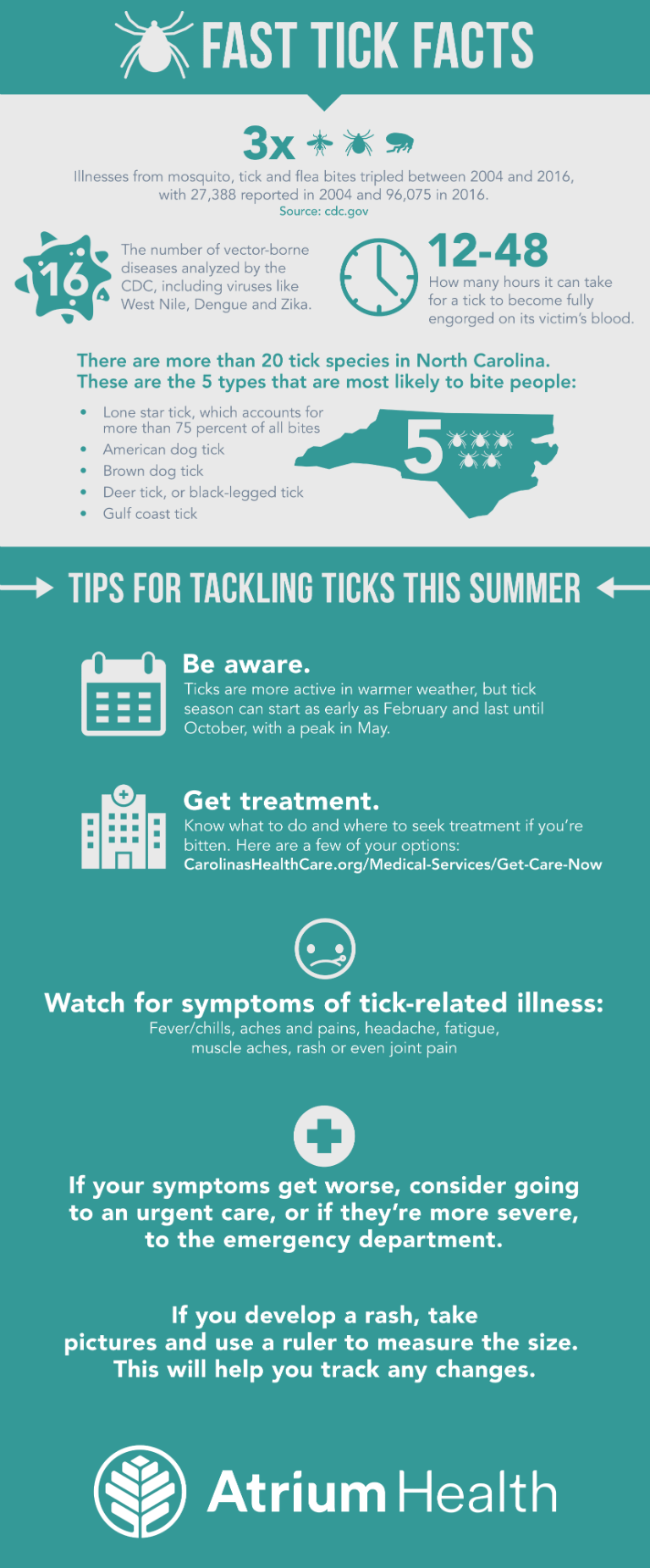If there’s one thing about summer that really bites, it’s the tick.
Tickborne illnesses are on the rise; the Centers for Disease Control says the number of tickborne diseases has more than doubled in the last 13 years. And we can attest to that. In a two-week span that included Memorial Day, Atrium Health emergency departments saw twice as many tick-related cases as the same time last year.
“Tick bites are always more common in the summer months. But we’re already seeing a drastic increase in the number of tickborne illnesses this year,” says Carmen Teague, MD, a specialty medical director in internal medicine at Mecklenburg Medical Group - Uptown. “And it’s not just here in the Carolinas – it’s something the CDC has seen across the country.”
But just because tickborne illnesses are increasing doesn’t mean you should avoid your favorite outdoor activities, like camping or hiking. It just means you need to be extra prepared and learn what makes these pesky bugs tick.
The tick checklist
While you might not be able to avoid ticks altogether, there are things you can do to avoid being bitten. “When you’re outside, the best thing you can do is take the right steps to protect yourself and your family,” says Dr. Teague.
You can start by telling ticks to bug off with this quick checklist:
- Check your clothes. To protect your skin from ticks, dress appropriately. Wear long sleeves, pants and high socks if you know you’re going to be outside – and especially if you’re near grassy, brushy or wooded areas. If possible, wear light-colored clothes, which make ticks easier to spot.
- Check the ingredients. The CDC recommends using insect repellant or products with permethrin, an ingredient that helps fight off ticks and other biting bugs.
- Check yourself and your family. While you’re outside, check yourself, your family and even your pets to make sure everyone’s clear of ticks. Shower soon after being outdoors, and perform a full body scan to make sure you didn’t miss any.
If you do see a tick crawling on your skin, brush it off right away. If it’s already attached, you need to remove it quickly – but carefully. Using tweezers, grasp the tick as close to the skin as you can, and pull upward. You’ll need to remove all of the tick, including its mouth-parts.

When the bugs bite
Unfortunately, even if you’ve taken all the right steps, it’s still possible to get bitten.
The good news is that not all ticks carry disease, but symptoms like fever and chills, fatigue, headache, achy muscles and rash can indicate a tick-related illness. More severe symptoms include joint pain, which can point to Lyme disease, and temporary paralysis, which can signal another rare tickborne illness.
If you’ve been bitten, Dr. Teague recommends talking to a doctor or nurse at your primary care office. “Tickborne illnesses can be difficult to diagnose, but the sooner your doctor knows what’s happened, the sooner they can begin treating you,” she says.
When it comes to tick bites, Dr. Teague has one last bit of advice: Don’t panic. “Getting bitten doesn’t always mean an immediate trip to the emergency room,” she says. “Sometimes a phone call or a trip to the doctor is all you need.”




